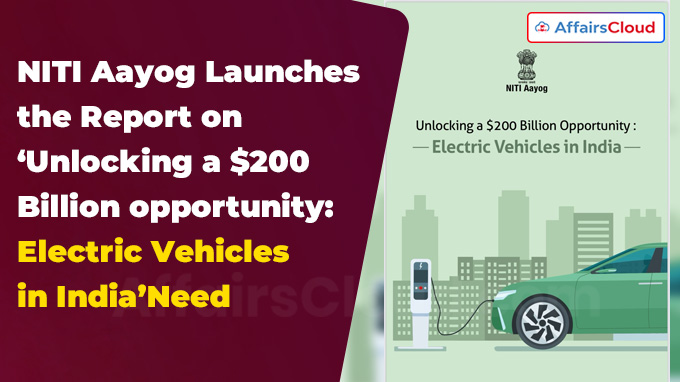
On August 4, 2025, National Institute for Transforming India (NITI) Aayog, the policy Think Tank of the Government of India (GoI), launched a report titled “Unlocking a USD 200 Billion Opportunity: Electric Vehicles in India” at a launch event in New Delhi, Delhi. The report serves as a strategic roadmap to help India achieve a 30% share of Electric Vehicles (EVs) in total vehicle sales by 2030.
- The report was released by Rajiv Gauba, Member of NITI Aayog, in the presence of BVR Subrahmanyam, Chief Executive Officer (CEO), NITI Aayog, Kamran Rizvi, Secretary, Ministry of Heavy Industries(MHI), O. P. Agarwal, Distinguished Fellow, NITI Aayog and Sudhendu Sinha, Programme Director – E-Mobility, NITI Aayog.
Exam Hints:
- What? Release of the report “Unlocking a USD 200 Billion Opportunity: Electric Vehicles in India”
- Who released? Rajiv Gauba, Member of NITI Aayog
- Goal: To achieve 30% share of Electric Vehicle (EV), in the total vehicles sold by 2030.
- Global Growth: 918,000 in 2016 to 18.78 million in 2024
- India growth: 50,000 in 2016 to 2.08 million in 2024(Rank: 6th)
- 2024 sales: EV accounted for 7.6% of total vehicle sales
About the Report:
Consultations: Shaped through extensive stakeholder consultations across seven dedicated sessions at NITI Aayog, the report presents a range of strategic approaches to accelerate India’s electric vehicle (EV) transition.
Blueprint: The report acts as a strategic roadmap to fast-track India’s EV transition. It highlights major challenges, outlines key enablers, and provides actionable recommendations to boost EV adoption.
Roadmap to Boost EV Adoption in India by 2030:
Growth: As per the report, the sale of EVs in India has increased from 50,000 in 2016 to 2.08 million in 2024, making India stand 6th globally, while the global sales have increased from 918,000 in 2016 to 18.78 million in 2024.
- The report describes the EV transition in India as slow to start, with the EV penetration of India, being one-fifth of the global penetration in 2020 to over two-fifth of penetration in 2024.
Sales: In 2024, the sale of EV vehicles is 7.6% of the total vehicles, which has taken 5 years. To achieve the goal of reaching 30% sales of EV by 2030, India must increase the annual sales of EV vehicles by 22% till 2030.
- Among the EV vehicles, electric (e) two wheelers and e-three wheelers have shown a significant increase in sales. Electric buses have shown slight progress, while the sales of Electric cars have been slow.
Challenge Factors: The report has underscored the challenges which slow the growth of EVs in India. It includes the burden of financing heavy vehicles such as electric buses and electric trucks, Inadequate charging stations and the under utilization of the existing charging stations.
- EV could not reach the targeted consumers due to lack of awareness regarding EV performance among public and private stakeholders, inadequate data and regulatory gaps.
Recommendations:
Mandate: The report has recommended a shift from subsidy-based to mandate-based strategy, as the current progress is dependent on financial subsidies, which are not sustainable or sufficient to the goal.
- The report suggests the announcement of a policy with clarity, with target timelines, for the adoption of Zero Emission Vehicle (ZEV), expansion of Corporate Average Fuel Efficiency (CAFÉ) norms to a wider segment of vehicles.
- It also suggests designing a stringent plant for mandating the production and purchase of EV and disincentivize the continuous usage or production of Internal Combustion Engine (ICE) Vehicle.
Saturation Program: The report recommends to design and start a saturation program to support 5 cities over 5 years and scale up to 20 cities and then to 100 cities.
Large Financing: The report has suggested a solution to create a fund with contributions from the public budget and multilateral development banks to provide low interest loans for the procurement of e-buses and e-trucks and to design a scheme to streamline the funds.
Research: The report has highlighted setting up an academia-industry-government partnership for accelerating research on new battery chemistries.
Charging Infrastructure: Identification of 20 high density corridors for e-bus and e-truck operations and commissioning a study to identify locations for charging hubs based on current voltage patterns on these corridors were recommended.
- The report also includes measures such as establishment of nodal agencies, exploration of Transit-Oriented Development (TOD) pricing, launch of a unified application, and the exploration of provision of special EV power lines (EVPL).
Capital costs: The report has recommended encouraging the establishment of a battery leasing industry, supporting battery passport system, nurturing the establishment of truck and bus leasing industries to reduce the capital costs.
About National Institute for Transforming India (NITI) Aayog:
Chief Executive Officer (CEO) – BVR Subrahmanyam
Headquarters – New Delhi, Delhi
Established – 2015




